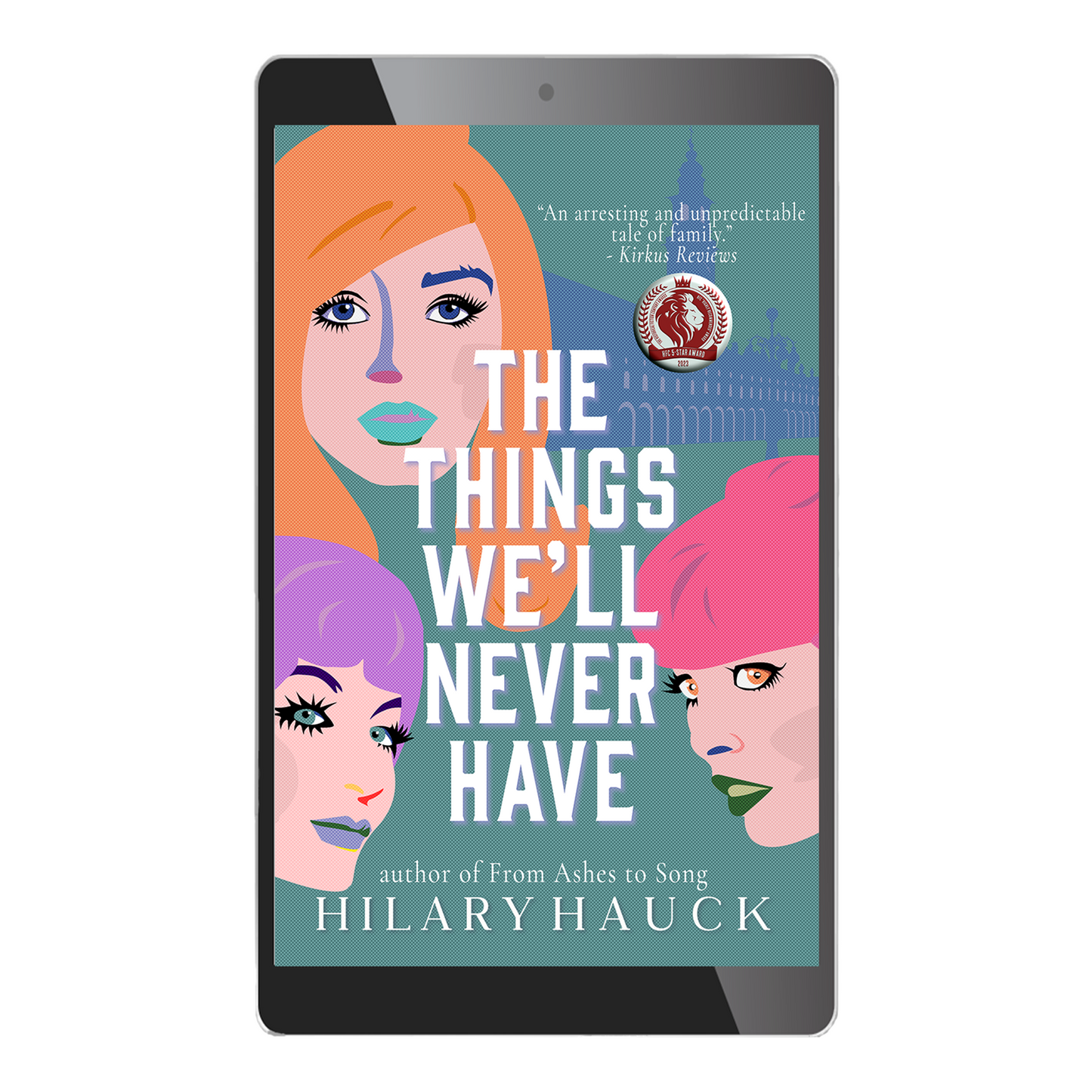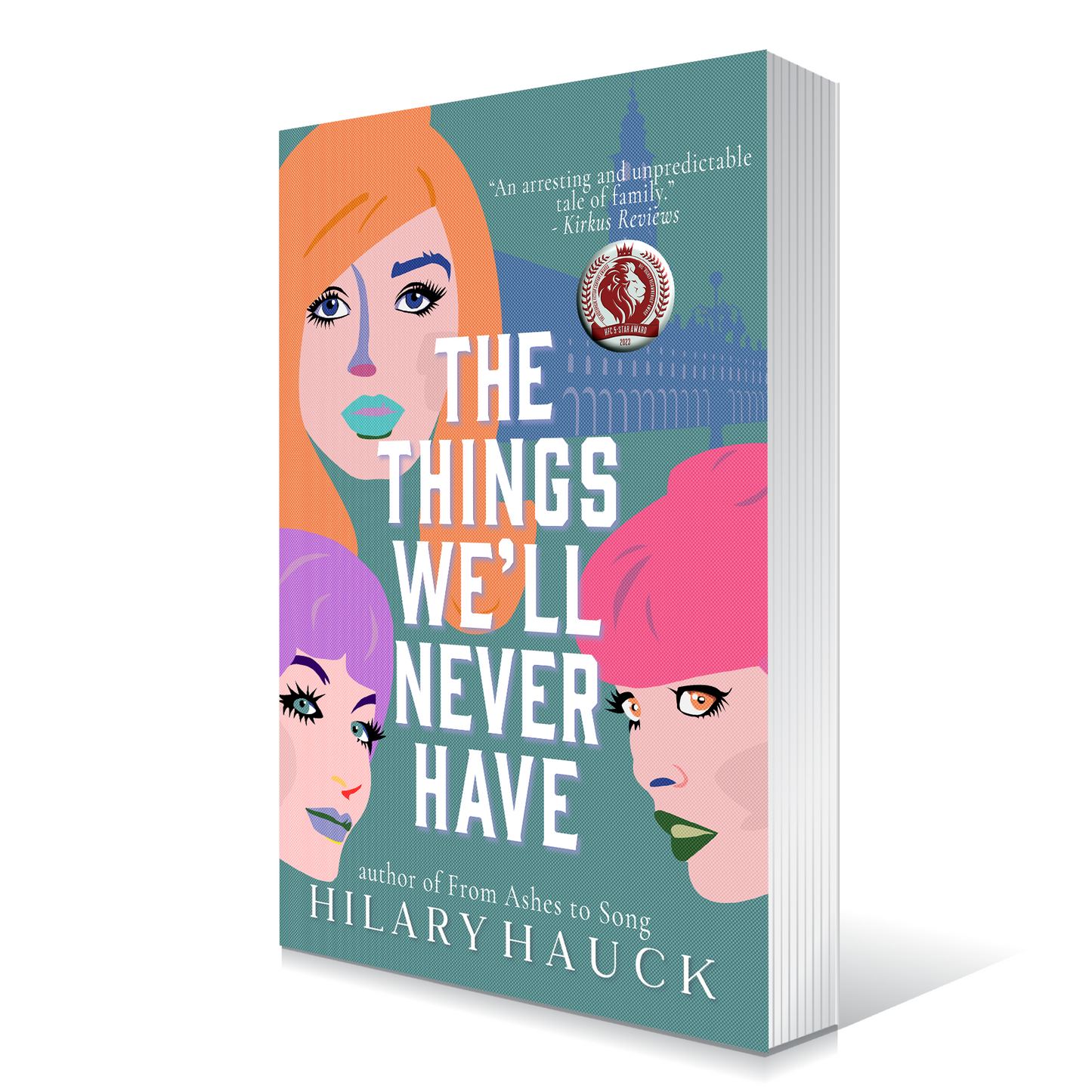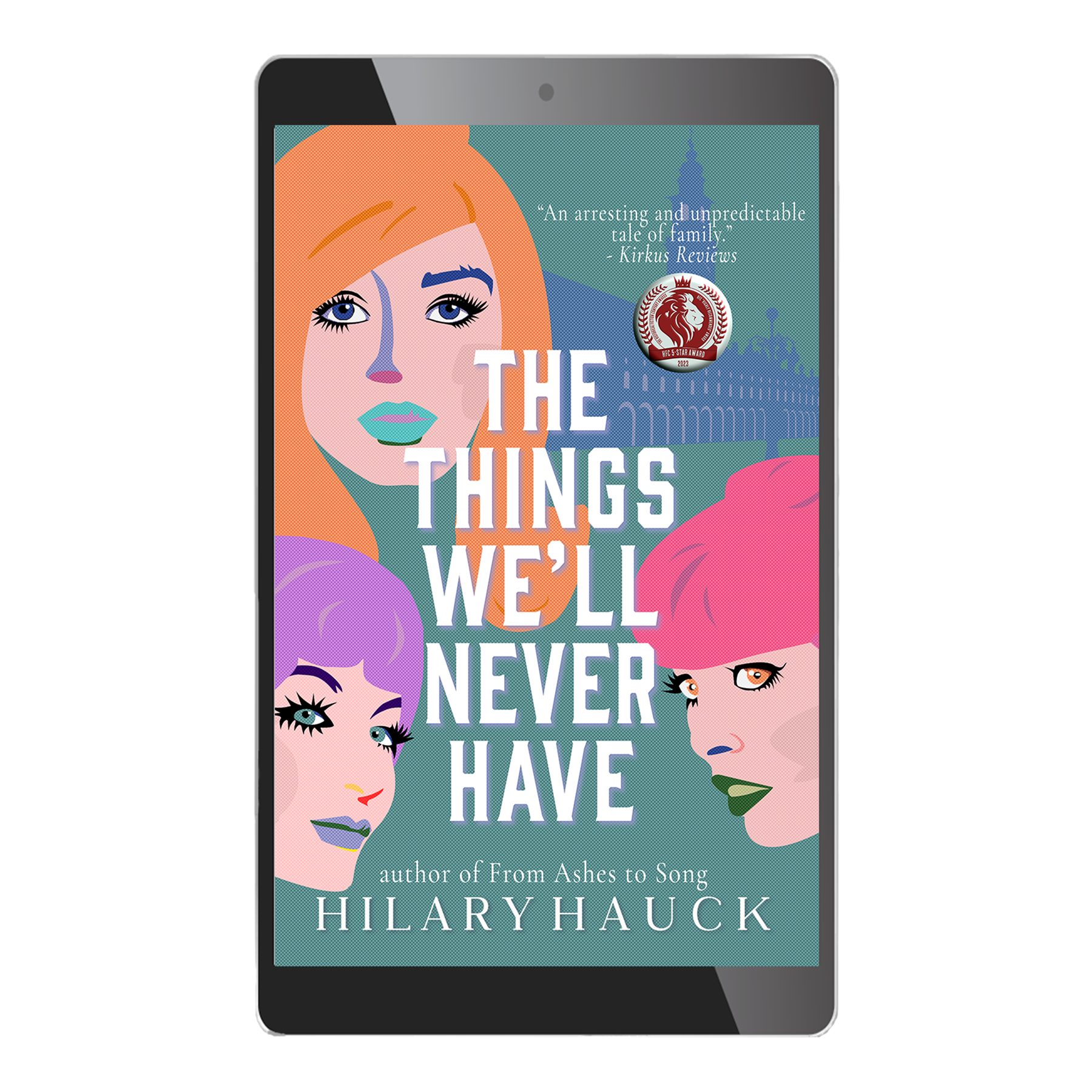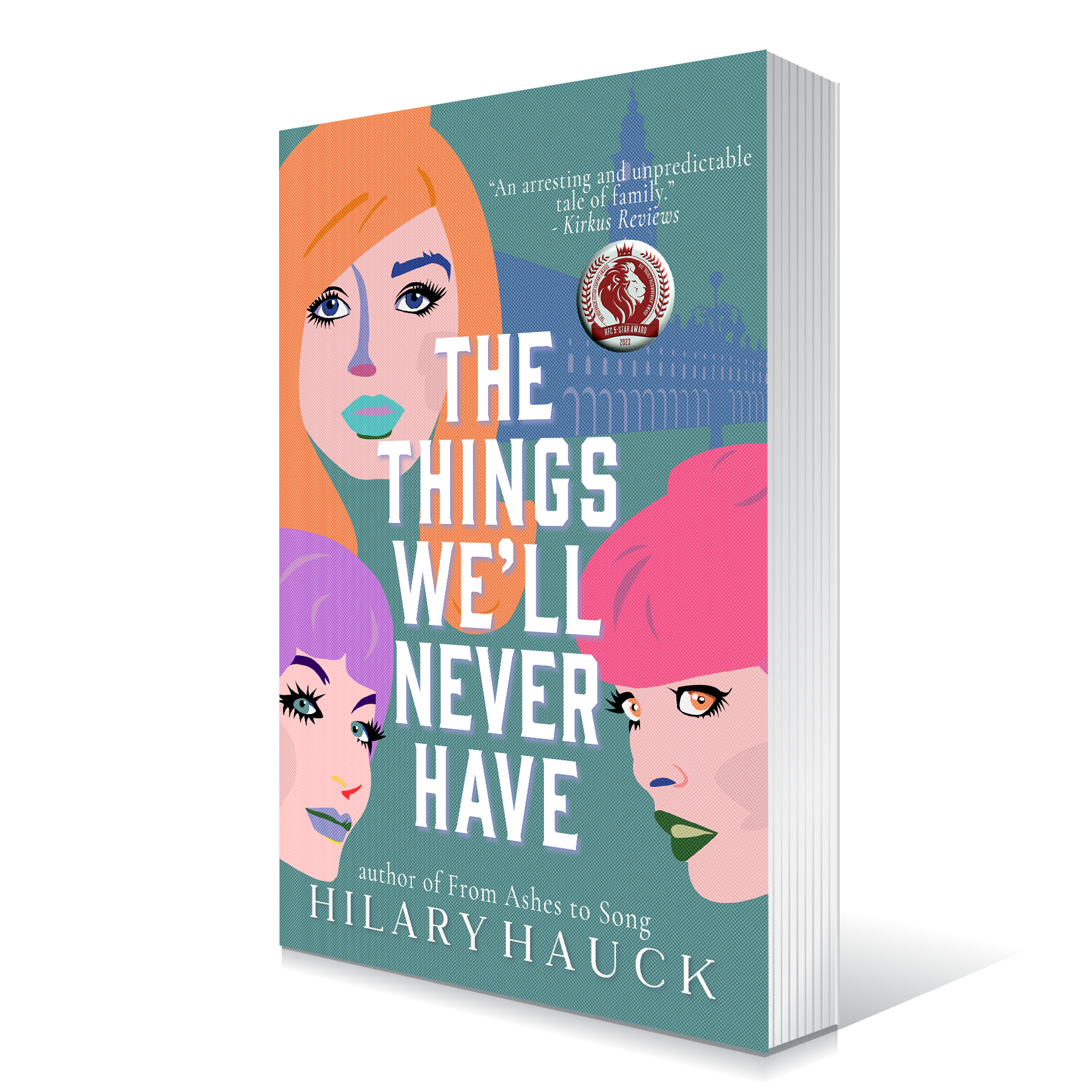Hilary Hauck
The Things We'll Never Have eBook
The Things We'll Never Have eBook
Everleigh’s arrival in a small Italian town unearths a web of secrets, shame, and unexpected honor in this gripping blend of mystery and psychological drama.
Couldn't load pickup availability



The Things We'll Never Have eBook
Everleigh’s dreams are crushed when her fiancé disappears weeks before the wedding she was counting on to color her otherwise dull existence in 1964 London. Driven by a need for closure and armed with letters from Gualtiero’s family as clues, Everleigh travels to Italy, convinced that he has returned to his roots. But when the man everyone claims is Gualtiero walks in the room, she finds herself staring into the face of a stranger.
Everleigh’s quest is no longer to find out where her fiancé is, but who he is. Her search takes an enthralling twist as she forges alliances with two unlikely companions. Together, they peel back the layers of hidden truths to unearth shocking revelations that set them on a collision course and shatter the foundation of everything they believed about family… and even their own identities.
Winner of the Historical Fiction Company's “Highly Recommended” Award of Excellence, The Things We’ll Never Have is a gripping tale of kinship, broken trust, and self-discovery painted against the vibrant backdrop of 1960s Italy.
Read a sample
Chapter 1
Everleigh
The house is hardly designed for secrets. The keyholes on the doors might as well be windows. I don’t consider it snooping, not really. It’s more like humoring the home’s intentions. We could just say it’s my little indulgence, a last nod to independence before our lives meld in marital bliss.
It’s not as though anything earth-shattering happens in there, anyway. I know what I’ll see. The same scene that greets me every Saturday afternoon. Gualtiero’s narrow frame sitting in his favorite chair, a bottle green affair with a lime cushion—a rather ghastly contrast if you ask me. Feet crossed, bent forward, black curls cascading, the two furrows between his eyebrows pointing to his magnificent nose. His deep brown eyes stare into the corner hidden from the keyhole. I know every inch of the room—there is nothing there.
He likes to stare at nothing. It’s not that he’s dull. I worried about that at first. He’s forlorn. Saturdays are when his cousin’s letter arrives with family news—who could blame him for a case of the doldrums?
I glance up at the landing to make sure the coast is clear, bend down slowly, and look. It’s a little check-in, just making sure everything is all right.
Well, I’ll be pickled. You’ll think me a liar—which I assure you is the last thing I am—but for the first time in all the Saturdays we’ve been living under the same roof, albeit not on the same floor, Gualtiero is not in his favorite chair.
It’s a tad disconcerting, a change in routine, and for a fleeting moment I am a six-year-old, as sad as Gualtiero on his worst day, sitting on the stairs waiting for the postman. But that was many moons ago. Now I’m a twenty-six-year-old plain Jane whose career high is a senior typist in the typing pool.
There’ll be an explanation. Perhaps Gualtiero has relinquished his favorite chair to plan our trip to Italy. I can just picture him sitting at the rolltop desk, holding it steady with his knees. The desk is our first shared piece of furniture, a rolltop desk propped up by the arm of the sofa. We picked it up at a jumble sale with the promise that he would mend its broken leg before our marriage. Rather stiff to open, he sets nothing on top of it in case it should fall. Ironic really, how our first piece of furniture came with something so fragile and breakable as a promise.
No doubt he is holding a pen in his gloriously flawed hands, his large palms, his underproportioned fingers, the perpetual split on his thumb. Writing to his family, telling them about the train journey we’ll soon take to visit them.
The keyhole isn’t big enough for me to see the desk. I can only see part of the mantelpiece, and I know what is on that, too. Not a thing.
I set my bag on the very edge of the bottom stair where dirty shoes are least likely to have walked, shuffle my brolly, which is still dripping, into my left hand, and knock a robust knock, clear in its intention. I’ll just say hello, check that we’re still on for dinner, and steal a look over his shoulder to see if he has the ink and paper out.
I count as I wait for him to answer. His flat is the same as mine, seven and a half steps from stove to door. Ten steps from bed to door. I hear not a single footstep.
Perhaps he’s popped out. Forgotten something. Yes, that’s it, gone to the Italian deli. He’ll have left a note under my door. Maybe today’s letter brought good news. Maybe his family is coming to our wedding after all, and he’s gone for some sweet cannoli or a bottle of Spumante to mark the occasion.
An early celebration of our wedding that is going to deliver me into a life of all-day lunches at the river, idle boat rides, lengthy conversations, warmth, completeness, even children, despite the fact I still haven’t figured out the practical terms of how this will all play out, because having children scares the socks off me. Plus, we won’t actually live in Italy. Gosh, I would never even be traveling to Italy if it weren’t for marrying Gualtiero. But it’s a thrilling thing to imagine, so I’ll cling to it for now.
At the top of the stairs, the floorboards outside my door creak. Good to stop anyone from peeking through my keyhole, which is as large and revealing as Gualtiero’s. I open the door slowly, so wanting to see a note of explanation on the mat, but it is bare.
I’m not sure what to do. I mean, is Gualtiero still planning to make dinner? Saturday is his night to cook. I cook on Wednesdays. Not that we should compare the two dinners—they share nothing in common except for the fact we eat them. Or at least we usually do. My hopeless attempts aren’t always edible.
I should freshen up, but I don’t feel like it. Mum would have me freshen up. She’d also pretend nothing odd was happening. Sweep it under the carpet, ignore the issue until it went away. She’d make a cup of tea. Not by any means the best way to go about things, yet I fill the kettle, set it on the stove, and strike a match to light the ring. In Mum’s world, a cup of tea solves everything. Maybe by the time the kettle whistles he’ll be back.
I check outside the front window. Just cars, tires sloshing, a mother and her little boy jumping in the puddles left by an earlier rain burst. Joyful. Which is what I’d be if I knew what was going on. The boy is passing Mrs. T’s house, which reminds me I forgot to drop off her Woman’s Weekly. She used to come into the newsagents for it but has trouble getting around nowadays.
I grab my keys and the magazine from my bag and march out of my flat. I veritably stomp down the stairs, not quite slamming the front door, but neither am I quiet just in case he’s home. Mrs. T opens quickly. She must have been waiting for me propped on her walking stick in the hallway.
“You’re a dear,” she says, which makes me feel rather rotten for not stopping for a chat. I can’t. I hate not knowing things I have a right to know.
Back inside, I knock on Gualtiero’s door three times, loudly enough that even Mrs. T might hear. I knock again, then bend down to look through the keyhole. There’s no movement or sound from inside, but in my flat the kettle whistles, making me jump. I stand upright, lift my hand to knock again—surely the whistle and the knock will summon the dead—but they haven’t summoned the dead; they’ve summoned my landlord. He’s standing at the top of the stairs, staring down at me.
“Hello.” I try to sound casual, ignoring the fact my hand is still raised, knuckles poised. This time, instead of a blasting rap, I knock gently. Nonchalantly. I even smile to show my landlord that everything is hunky-dory, praying he didn’t get there in time to see me looking through the keyhole. Shrugging my shoulders and putting on my best gosh-could-he-really-not-be-home look when the knock fails, I go back upstairs, smiling as I reach the creaky floorboard and point to my front door.
“The kettle,” I say, in case he hasn’t heard it.
***
The colors in my flat are red, orange, and blue. I feel they raise me up while Gualtiero’s greens and browns weigh me down. We haven’t yet spoken about what colors we’ll have once we’re married. Nor have we discussed how much decor we’ll have. Contrasting with Gualtiero’s bare mantelpiece, mine has a potted ivy, two empty but decorative pots that’ll one day have plants in them, and a birthday card from Mum. I could’ve quoted the sentiment before I even opened it—sorry it’s late! The card is next to a picture of my brother, Edward, wearing the army uniform Gualtiero thinks denotes him as a hero. I offered to bring it downstairs to Gualtiero’s flat because he doesn’t have pictures of his family. There never have been any. Despite an old wartime camera that kicked around between his friends, his family doesn’t understand modern contraptions like cameras, he told me, his accent adding a couple of syllables to the word contraption. One day, we take a picture usselves. Oh, how I love that promise.
As it appears that I’m on my own for supper, I throw together some cheddar cheese on toast and heat—or rather burn—some baked beans to pour over the top. All the while, I listen out for doors opening or closing.
Before bed, I contemplate going back down to knock just in case he came in without me hearing, but gosh, Gualtiero, this is so unfair. I stay resolutely put. Let him see that I just don’t care.
The Things We'll Never Have eBook
“… a moving novel that’s one part mystery and one part gripping psychological drama, and Hauck’s writing style has a straightforward simplicity that makes the story’s revelations feel all the more powerful. With remarkable subtlety and suspense, the author chronicles Everleigh’s attempt to figure out not only where Gualtiero is, but who he is…”
KIRKUS REVIEWS
“For those who love historical literary, deep with meaning for the characters and giving the readers a moment of pause to reflect on their own lives, then this is a great book to read. Very well done. “The Things We'll Never Have” by Hilary Hauck receives five stars and the “Highly Recommended” award of excellence by the Historical Fiction Company.”
HISTORICAL FICTION COMPANY
“From its low-key beginning… to its gut-wrenching ending, this novel is a literary masterpiece. Hauck’s prose is both lyrical and masterful, and deep meaning underscores every carefully crafted aspect of the tale. As a story with roots in World War II, The Things We’ll Never Have is a love song to Italy, and a testament to the Italian spirit. A rewarding read to be savored in depth.”
EILEEN ENWRIGHT HODGETTS, author of THE GIRL ON THE CARPATHIA
“Scattered throughout the book are white-knuckle scenes that the reader begins with eagerness and tension. Chapter by chapter, the heart palpitating suspense continues. The Things We’ll Never Have is replete with nerve-racking situations that are written in crisp and clear prose with literary sensitivity. The reader is richly rewarded with scenarios and sensibilities that are strewn like pink lotus on a blue pond. The Things We’ll Never Have is a real page turner and pleasurable must read!”
MADHU BAZAZ WANGU, author of THE LAST SUTTEE
“Hilary Hauck’s new novel mixes poignance and humor, love story and mystery. It’s the swinging 60’s London. Everleigh, an aspiring fashion designer, is engaged to be married, but her fiancé disappears. She travels to his home village in Italy, right to his family’s door, and finds confusion and rejection rather than the man she expected. Readers will fall in love with the brisk, persistent Everleigh as the determined textile artist unspools, unravels, and re-weaves her story.”
ELLEN PRENTISS CAMPBELL, author of FRIEDA’S SONG

Meet the author
An Italian speaking Brit living in the US, Hilary Hauck is a bestselling,
award-winning author of historical and fantasy fiction featuring characters struggling
to find their inner amazing. Raised in the UK, Hilary later lived in Italy,
where she mastered the language, learned how to cook food she can no longer
eat, and won a national karate championship. After meeting her husband, she
came to the US and drew inspiration from Pennsylvania coal history for her
debut novel.



